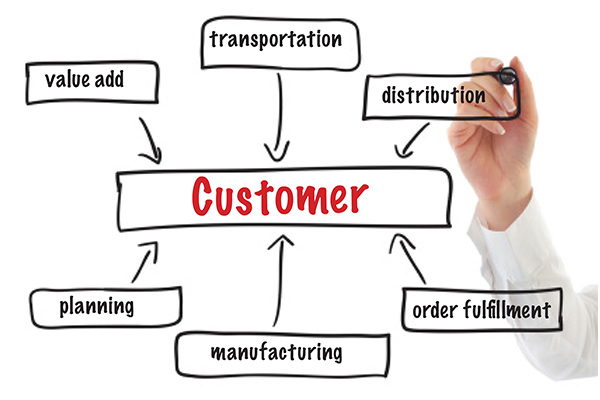Sorry, but your login has failed. Please recheck your login information and resubmit. If your subscription has expired, renew here.
September-October 2018
If it’s September, it must be time for Gartner’sTop 25 supply chains, the lead article in this issue of Supply Chain Management Review. As I was reading this year’s contribution from Gartner, I was struck by the number of the Top 25 that have launched NextGen Supply Chain initiatives, using Big Data, artificial intelligence (AI), robotic process automation (RPA), machine learning and the like to digitize their supply chains. It made me wonder: Is the rest of the pack falling behind or are they ready to follow the leaders? Browse this issue archive.Need Help? Contact customer service 847-559-7581 More options
Every year, Gartner publishes its supply chain “Top 25.” The list includes firms such as Apple, P&G, Amazon, Unilever and Inditex (the owner of Zara). Each has succeeded in using their supply
chains not simply to drive down costs but, more importantly, to improve overall performance. In other words, these firms discovered that their supply chains are effective and efficient strategic weapons. For many managers, this goal is becoming their Holy Grail—that of turning their supply chains into truly strategic weapons.
That’s easier said than done, and not every organization is ready for the transformation. We examine this challenge by framing it with seven key questions that you, as supply chain managers, must be willing to ask. These questions, based on numerous years of research and experience working with leading edge supply chain companies combined with results generated by past empirical studies such as the “Supply Chain Management: Beyond The Horizon,” a joint study sponsored by the department of supply chain management and Michigan State University and APICS to clarify what is meant by strategic supply chain management. The questions address whether your firm is ready to make the transition from a conventional operational price-driven supply chain to a strategic, value-driven supply chain. In asking these questions, you will develop a better, more rounded understanding of strategic supply chain management in a way that can be immediately applied in your firm.
1. Who are your firm’s key customers?
According to Gartner, top supply chains “are designed starting with what brings value to customers and then back through the supply network.” But, remember that not all customers are created equal. Some are more important than others. It is these latter customers that firms strive to profitably delight. These customers drive how your supply chain ecosystem is designed, deployed and managed. If your firm strives to treat all customers as equally important, two negative results can be expected.

This complete article is available to subscribers only.
Log in now for full access or start your PLUS+ subscription for instant access.
SC
MR
Sorry, but your login has failed. Please recheck your login information and resubmit. If your subscription has expired, renew here.
September-October 2018
If it’s September, it must be time for Gartner’sTop 25 supply chains, the lead article in this issue of Supply Chain Management Review. As I was reading this year’s contribution from Gartner, I was struck by the… Browse this issue archive. Access your online digital edition. Download a PDF file of the September-October 2018 issue.Every year, Gartner publishes its supply chain “Top 25.” The list includes firms such as Apple, P&G, Amazon, Unilever and Inditex (the owner of Zara). Each has succeeded in using their supply
chains not simply to drive down costs but, more importantly, to improve overall performance. In other words, these firms discovered that their supply chains are effective and efficient strategic weapons. For many managers, this goal is becoming their Holy Grail—that of turning their supply chains into truly strategic weapons.
That's easier said than done, and not every organization is ready for the transformation. We examine this challenge by framing it with seven key questions that you, as supply chain managers, must be willing to ask. These questions, based on numerous years of research and experience working with leading edge supply chain companies combined with results generated by past empirical studies such as the “Supply Chain Management: Beyond The Horizon,” a joint study sponsored by the department of supply chain management and Michigan State University and APICS to clarify what is meant by strategic supply chain management. The questions address whether your firm is ready to make the transition from a conventional operational price-driven supply chain to a strategic, value-driven supply chain. In asking these questions, you will develop a better, more rounded understanding of strategic supply chain management in a way that can be immediately applied in your firm.
1. Who are your firm's key customers?
According to Gartner, top supply chains “are designed starting with what brings value to customers and then back through the supply network.” But, remember that not all customers are created equal. Some are more important than others. It is these latter customers that firms strive to profitably delight. These customers drive how your supply chain ecosystem is designed, deployed and managed. If your firm strives to treat all customers as equally important, two negative results can be expected.
SC
MR


Latest Supply Chain News
Latest Podcast

 Explore
Explore
Procurement & Sourcing News
- Benchmarking the complexity of ESG reporting
- Looking back at NextGen 2024
- The Corporate Sustainability Due Diligence Directive
- How to make your CFO a supply chain superfan
- AI is moving omnichannel closer to the customer
- E-tailing update: Brick-and-mortar retailers struck back
- More Procurement & Sourcing
Latest Procurement & Sourcing Resources

Subscribe

Supply Chain Management Review delivers the best industry content.

Editors’ Picks





